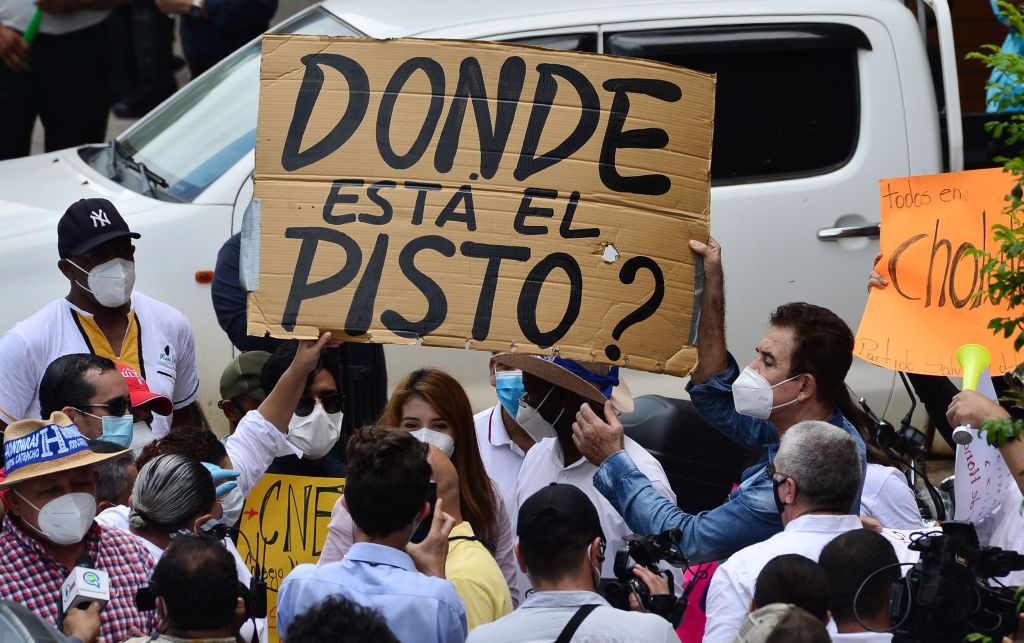Honduras just killed corruption charges against government officials and a family member of President Juan Orlando Hernández. The move is a fatal blow to anti-corruption efforts in one of the region’s shadiest countries and a key ally of United States President Donald Trump.
The dismissal of the charges against 22 defendants in the case known as “Pandora” promises to leave criminal acts by the nation’s most powerful go unpunished in this Central American nation, already besieged by drug trafficking and violence.
Videos by VICE
Yet the Trump administration will send some asylum seekers who make it to the U.S back to Honduras, which it considers a “safe” third country, to be processed once COVID-19 restrictions are lifted.
“It has helped turn back the clock ten years on the anti-corruption fight in the country,” said Dr. Lester Ramírez, a lawyer and director of transparency for local watchdog A More Just Society. He told VICE News that a “culture of impunity” has thrived in Honduras with the tacit approval of Trump’s government.
The Pandora allegations involved roughly $12 million dollars that were embezzled from public projects and redistributed under the direction of the president’s sister, Hilda Hernández. The funds were spent on political campaigns or diverted into the pockets of politicians, according to prosecutors and witnesses.
At least five members of the Hernández family – including the president – were linked to the corruption scheme, which observers think is just a small part of a much larger conspiracy involving as much as hundreds of millions of dollars.
Tony Hernández – the president’s brother and a former legislator – was also linked to the case. Tony was already convicted of drug trafficking charges in October 2019 in the United States, and President Juan Orlando Hernández, also known by his initials JOH, was named as an unindicted co-conspirator in that case. U.S prosecutors alleged that JOH received bribes from multiple drug traffickers – including $1 million from Joaquín “El Chapo” Guzmán.
President JOH has vehemently denied all accusations linking him to the drug trade.
And despite the mounting accusations against him, the Trump Administration has turned a blind eye as Hernández continues to accommodate its shifting migration agenda in the region.
The U.S and Honduran governments signed a controversial safe-third country agreement last year to deport asylum seekers to what is one of the most violent countries in the world. The policy has not yet been implemented owing largely to the flow of migrants through Central America being choked off by COVID-19 lockdowns.
Critics argue that Trump’s solo focus on enforcement fails to address the root causes of migration. Corruption and violence, in part fuelled by the international cocaine trade, are major factors driving migrants north in search of better lives. Graft was estimated to cost the Honduran economy $2.6 billion in 2018 – equivalent to 12.5 percent of GDP.
Another shining example of the Trump government’s schizophrenic relationship with Honduras is the dismantling of an international anti-corruption mission earlier this year that helped build the Pandora case and other high-profile indictments. Known as the MACCIH, the body was financed primarily by the State Department and hailed as a success by independent observers. But it was left for dead in January after U.S support for the renewal of its mandate evaporated amid ongoing negotiations over migration enforcement policies.
The Pandora case began a decade ago when a lawyer called Fernando Suarez allegedly started working with JOH’s sister Hilda to siphon public funds through a pair of nonprofits he controlled.
“Hilda Hernández was like the executive director,” said Omar Menjívar, a lawyer representing Suarez, the sole defendant in the case who is cooperating with prosecutors. “Nothing moved if she didn’t give the order.” Hilda was a former government minister who died in a helicopter crash in December 2017.
Suarez was the sole signatory on the bank accounts of each. Checks were deposited into the accounts of political parties as well as to a number of legislators and campaign coordinators, in particular many aligned with Hernández. The rest of the funds were allegedly used to pay the expenses of Hernández’s 2013 presidential campaign, which Hilda Hernández co-chaired.
The dismissal of the charges in Honduras was appealed by the public prosecutor’s office this week, drawing praise from the U.S State Department.
“The Pandora case is an emblematic corruption case,” said Michael G. Kozak, acting assistant secretary for the Bureau of Western Hemisphere Affairs in an August 10 tweet that also applauded the Honduran attorney general for his decision to appeal.
But Kozak stopped short of acknowledging why the case is emblematic.
“[The case] reveals the criminal network of the Hernández family,” said Ramírez.





